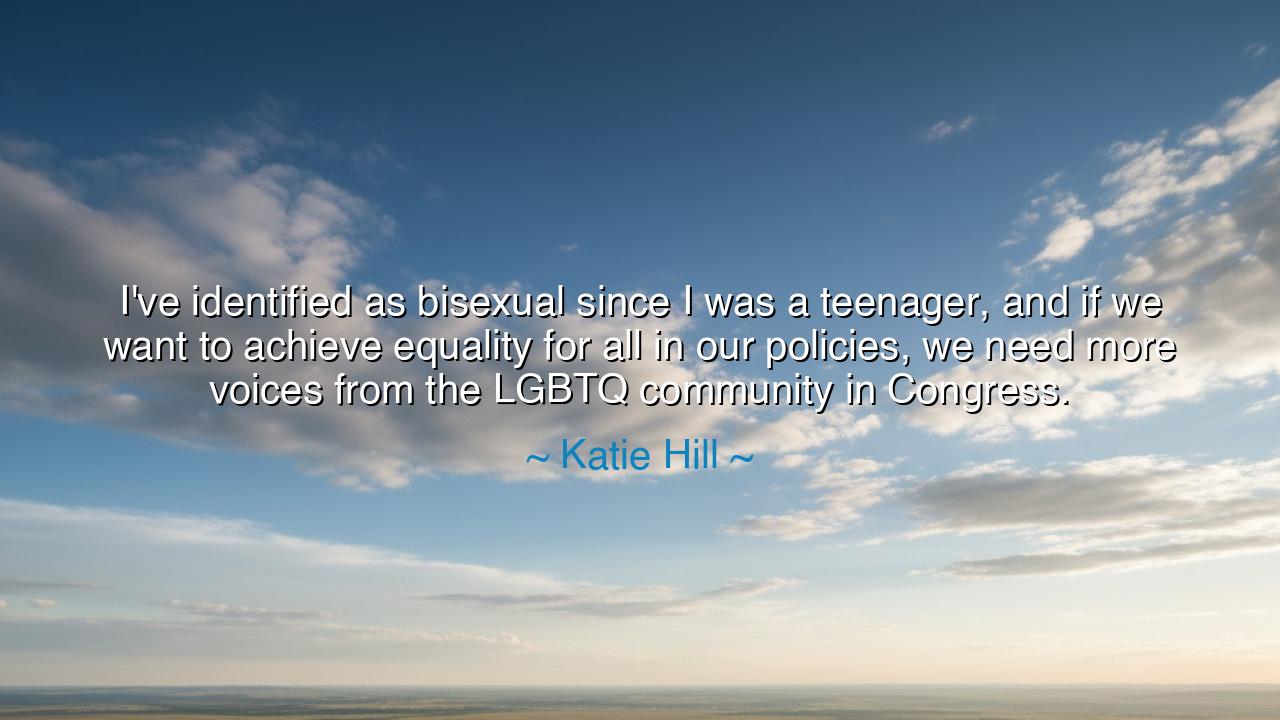
I've identified as bisexual since I was a teenager, and if we
I've identified as bisexual since I was a teenager, and if we want to achieve equality for all in our policies, we need more voices from the LGBTQ community in Congress.






The words of Katie Hill — “I've identified as bisexual since I was a teenager, and if we want to achieve equality for all in our policies, we need more voices from the LGBTQ community in Congress.” — rise like a declaration from the heart of a new age. They speak of identity, representation, and the eternal struggle of humankind to be seen as whole. Beneath their modern form beats an ancient truth: that justice cannot flourish where voices are silenced, and that equality cannot live where only some are allowed to speak. In her words, there is courage — the courage to stand in truth before a world that often demands silence, and to remind all that equality is not granted by decree, but built by participation.
Katie Hill, a former U.S. Congresswoman, was among the youngest women ever elected to the House of Representatives, and one of the few openly bisexual members to serve. Her quote reflects not merely her own identity, but her understanding of the sacred duty of representation. In her eyes, the halls of power must reflect the full tapestry of the people — their loves, their fears, their dreams, and their differences. For too long, the voices of the marginalized have been whispers in the great chamber of democracy, drowned out by those who have never known exclusion. Hill’s words are a call to balance, to inclusion, to the recognition that true equality must be written not just in law, but in the faces of those who shape it.
The ancients, too, knew that a city could not stand upon one pillar alone. In Athens, the philosophers taught that every citizen must take part in the governance of the polis, for without the counsel of many, wisdom collapses into tyranny. So it is in our own time: a democracy that excludes any part of its people is not whole. When Hill calls for LGBTQ voices in Congress, she speaks the same truth that guided the founders of justice in every era — that governance without diversity becomes blindness, and law without empathy becomes cruelty. It is not enough to legislate for the people; one must legislate with the people, all the people.
History is filled with those whose presence alone changed the course of justice. Consider Harvey Milk, one of the first openly gay elected officials in the United States. His service was not merely symbolic — it was transformative. Through his courage, he gave a generation permission to exist openly, to demand dignity, and to see themselves as part of the public good. Like Hill, he understood that visibility is power, and that representation is the seed of reform. For when those who have been unseen stand in the light, they bring with them the truth of their struggles, and that truth becomes the compass of compassion for the nation.
Katie Hill’s statement also reminds us that equality is not a finished monument but a living work. It must be built, stone by stone, by those who know its absence. Her acknowledgment of her bisexual identity is not mere confession — it is resistance against the erasure that history has often imposed. She speaks not only for herself, but for all who have been taught to hide what they are. In naming herself, she gives voice to countless others still searching for the courage to do the same. For to be visible in a world that prizes conformity is an act of defiance, and every act of defiance against injustice is a step toward freedom.
In the spirit of the ancients, we might say she embodies the warrior of truth — one who fights not with sword or flame, but with the power of authenticity. Her struggle, and that of the LGBTQ community she champions, is the same eternal battle fought by all who seek equality: the struggle to transform exclusion into belonging, shame into pride, silence into song. Just as the philosophers once fought for reason, and the prophets for mercy, so too do these modern warriors fight for the right to exist fully and freely within the human family.
The lesson to carry forward is clear: equality cannot be achieved by words alone. It must be lived, spoken, and embodied by those who dare to step into the arena of power and refuse to hide. If you wish to build a just society, include every voice — especially those long silenced. Do not wait for others to speak on your behalf; stand, even trembling, and let your truth be heard. For every voice that joins the chorus of justice strengthens the harmony of freedom.
And so, let this teaching be passed on: representation is not a privilege, but a responsibility. The world grows just not when one person rises, but when all are invited to rise together. As Katie Hill reminds us, equality is not an abstract dream — it is a living act, renewed each time someone steps forward to be seen, to be counted, and to lead. In that courage lies the promise of progress — that one day, the chambers of power will echo not with the voices of the few, but with the full chorus of humanity, singing as one.






AAdministratorAdministrator
Welcome, honored guests. Please leave a comment, we will respond soon